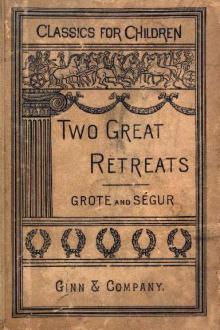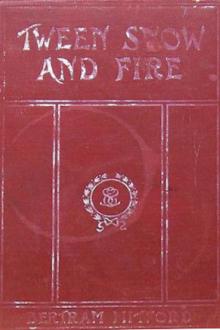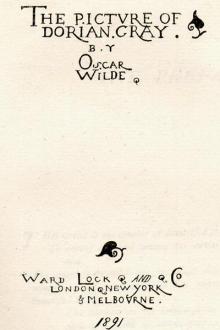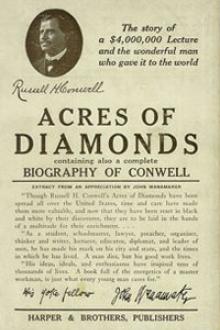The Two Great Retreats of History
Book Excerpt
After many delays, this latter course was the one they finally resolved to take, and owing to Xenophon's courage and resolution it turned out successfully.
After eight months of wandering, hardships, and peril, they all came in sight of the Euxine, and perhaps no shipwrecked sailors clinging to a raft ever cried "Land!" "Land!" with more joy than those Greeks who had climbed a hill-top shouted "The Sea!" "The Sea!"
Thanks to their own bravery, to their able leader, and finally to Persian vacillation and cowardice, this little army had now reached a place of safety. It was long, however, before they got back to their native country, and when they did, they were not to arrive at its shores asleep, on shipboard, as the much wandering and storm-tossed Ulysses came to his beloved Ithaca.
It is doubtful, indeed, how many of the
Editor's choice
(view all)Popular books in History, War
Readers reviews
Review of 'The Two Great Retreats of History':
-'The Retreat of the Ten Thousand', Greek expedition to restore Persian King,
in 401 to 399 before Christ
-'Retreat of Napoleon from Moscow', French expedition against Russia in 1812
The book is an adaptation of the chapter on 'Anabasis' ('March Up-country',
also known as 'The Retreat of the Ten Thousand') written in Greek by General
Xenophon and translated by George Grote in his 'History of Greece', plus a
translated abridgment of the book 'L'Histoire de Napoleon et de la Grande
Arm‚e en 1812' written in French by Count Philippe Paul de S‚gur. The two
authors, Xenophon and de S‚gur, were eye witnesses of the events, military
leaders in them, and provide rich detail. It is necessary reading for those
who love military adventures, and their deep effects on History. This double
book was published by Ginn in 1889 under direction of David Henry Montgomery.
A short synopsis of the two retreats follows this review for Many Books Net.
Xenophon (about 430 to 355 before Christ), Athenian Greek, was a disciple of
Socrates. During the Peloponnesian War against Sparta and allies (431-404 bC)
he distinguishes himself as a young soldier of the Athenian Army. He takes
part of the Greek expedition in 401 to 399 before Christ, trying to restore
the Persian King. They win the battle of Kunaxa (September 401 bC), but the
King dies in it and the Persians abandone them. They start a difficult retreat
to Greece. After the death or capture of most other Greek chiefs, Xenophon is
the most charismatic leader of the Ten Thousand (mostly Greeks, some Anatolian
and other allies), and guides their return amid perils few times in History
faced by a military force across hostile countries, for a distance so long.
-423 bC: Darius Nothus becomes King of Persia. He marries his half-sister
Parysatis and has two sons: Artaxerxˆs Mnemon and Cyrus the Younger. By
influence of Queen Parysatis, Cyrus the Younger is made Satrap of Lydia and
West Anatolia at 16 years of age. His Satrapy includes some Greek cities.
-404 bC: King Darius Nothus dies. Artaxerxˆs Mnemon is declared new King, but
Queen Parysatis convinces Cyrus the Younger that he really is the legitimate
King, not Artaxerxˆs. Cyrus plots to kill Artaxerxˆs, but is denounced by
Tissaphernˆs, Satrap of Caria. Cyrus is condemned to die, but saved by Queen
Parysatis, who holds him tight, kisses him, and desperately yells in bitter
tears that they would have to kill her too. No one dare touch the Queen. So,
Artaxerxˆs permits Cyrus to return to Lydia and continue being ruler of that
Satrapy. Cyrus still believes that he is the true King of Persia, and begins
mustering an army of Greek mercenaries under command of Klearchus, former
Governor of Byzantium (later called Constantinopolis, now Istambul, Turkey).
Ten thousand Greeks are the elite of Cyrus Army, plus a hundred thousand
auxiliaries from Anatolia and other parts of the Persian Empire. Cyrus knows
that Artaxerxˆs can muster a million men, but of dubious military quality.
-April 401 bC: Cyrus Army starts from Sardis, capital of Lydia, supposedly
against the Pisidians, wild tribes of the mountains at the south-east of
Lydia. Klearchus commands the Greeks, while Proxenus, Xenophon and other
distinguished Greeks command their respective units. Cyrus and Klearchus
know that the real target are not the Pisidians, but Babylon, then capital
of the Persian Empire. All the other men believe that they will fight the
Pisidians. Artaxerxˆs also believes that his Satrap and brother is marching
against the Pisidians. When reports come that Cyrus has deviated his route
and is now moving towards Babylon, Artaxerxˆs still believes that Cyrus has
chosen to fight his old enemy, Satrap Tissaphernˆs. Artaxerxˆs does not like
Tissaphernˆs either, and decides to let Cyrus have his revenge against him.
Arriving to Tarsus, in Cilicia, the Ten Thousand now realise that the target
is not the Pisidian mountains. They complain, but Klearchus increases their
pay with gold from the Treasure of Cyrus. Klearchus does not yet reveal the
real target, but the most intelligent begin to guess that it is Babylon.
-June 401 bC: Cyrus Army reaches Thapsacus and crosses the River Euphrates.
Artaxerxˆs begins to suspect foul play from the part of his brother Cyrus.
-Early September 401 bC: Cyrus Army reaches the River Tigris near Bagdad.
Artaxerxˆs is now seriously alarmed, and begins mustering his Royal troops.
Cyrus Army crosses the Median Wall (a military barrier) before Artaxerxˆs
could have time to garrison it. When the Cyreian forces reach Kunaxa, the
first Royal troops finally appear at distance, prepared to engage in combat.
Many thousands of Persians approach slowly. The Greeks give a fierce shout
to Mars, God of War, and charge like bulls. Most Persians lose heart and try
to flee. Cyrus sees his brother Artaxerxˆs at the centre of the Persians,
and rashly runs to engage him. Cyrus strikes a blow that wounds Artaxerxˆs,
but a javelin from the Royal Guard kills Cyrus on the spot. Seeing Cyrus
dead, the Persian auxiliaries of Cyrus turn and escape. The Greeks, most of
whom had not perceived the slain of Cyrus, continue the fight. Artaxerxˆs
troops are forced back, but when the victorious Greeks return to their camp,
they see that the Persian auxiliaries have fled and taken the stores away.
Artaxerxˆs sends emissaries who speak Greek and request surrender, but the
Ten Thousand refuse. They still have a few Persians commanded by Ariaeus, a
Persian nobleman. The Ten Thousand suggest Ariaeus to take place of Cyrus
and fight for the Persian Throne with their help, but Ariaeus replies that
Persian Nobility would never tolerate that, since he is not of Royal Blood.
The Ten Thousand then decide to retreat, not by the desert through which
they had arrived, but by the mountains at the North (the modern Kurdistan).
The rest of this epic history is left to the reader of Many Books Net.
Napoleon Bonaparte (1769-1821), of Italian ancestry, enlisted in the French
Army at Brienne and became Artillery officer. He distinguished himself when
commanding French Republican forces at Toulon in 1793 against British, Spanish
and French Monarchist forces. At the age of 25 he became the youngest general
in Europe, fighting successfully in Italy in 1794, but separated from command
after the events of 9th Thermidor. After the 13th Vendemiaire he obtained the
command of the French Republican Army in Italy in 1796, impressing Europe with
a chain of victories. Already with strong influence in the Directoire, he
commanded the ill-fated French expedition to Egypt (1798-1799), showing that
French Arms were superior on land, but inferior to the British Navy at sea.
Realising that Republican France could not defeat the British Fleet, he chose
to return to France and provoke the Coup of 18th Brumaire (9th November 1799),
becoming First Consul. After Marengo in 1800 and other impressive victories
on the battlefield, he became Consul for Life in 1802 and Emperor in 1804. He
then followed an aggressive policy against ALL of Europe, being victorious at
Austerlitz, Jena, Eylau, Friedland, Eckmuhl, Wagram and other battles.
Having most of Europe (except the British Isles) under his boot, he proceeded
to name his friends and relatives 'kings' and 'princes' of various countries.
His first drawback was in Spain. Having succeeded in capturing the gullible
King of Spain as a 'guest' of French 'hospitality', Napoleon then forced the
intrusion of his own brother Jos‚ Bonaparte as 'king'. This was too much for
Spanish pride, still an imperial nation. A bloody revolt exploded in Madrid
on 2nd May 1808 against the strong French divisions already stationed in the
Spanish capital, starting an obstinate, savage, relentless, brutal guerrilla
war against French presence in Spain and political liberal ideas coming from
it. Spanish women were noted for a ferocity not inferior to their own men.
With British help, Spain and Portugal became aflame. Napoleon then tried to
force other European powers into blockading and isolating Britain and the
Iberian Peninsula. Most Europeans yielded, but Russia said 'No'. After an
ultimatum, Napoleon decided to invade Russia. 700 000 men and 40 000 horses
from France and European allies started in June 1812 the historical march
against Russia. The vast majority of men and horses never returned, they died
in the vast frozen lands of Russia. Cold, hunger and enemies annihilated them.
Count Philippe-Paul de S‚gur (1780-1873) was French General and participated
of the French expedition to Russia. He survived, and wrote "L'Histoire de
Napoleon et de la Grande Armee en 1812", which is perhaps the best account of
the terrible hardships that they confronted. The Grand Army was mainly French,
but the Emperor compelled his allies (Austria, Prussia, Poland, German and
Italian States, and others) to furnish huge numbers of troops. Besides the
Imperial Guard (a body of picked men over 50 000 strong under command of
Marshals Lefebvre, Mortier and BessiŠres), there were 13 Army Corps. The
French were led by Marshals Davout, Oudinot, Ney and Murat ('King' of Napoli),
the Italians by Prince Eugene, the Austrians by General Schwartzenberg, the
Prussians and other Germans by Saint Cyr, Regnier, Vandamme, Victor, Augereau
and Macdonald, and the Poles by Poniatowski. There were smaller contingents
from most other European nations. The disaster made Napoleon lose his Empire.
-April-May 1812: Napoleon musters the Grand Army at the River Niemen, then
boundary between Prussian-controlled Poland and Russian-controlled Poland.
-June 1812: the Grand Army crosses the Niemen and occupies without serious
resistance Wilno (Vilnius, then in the Russian Empire, now in Lithuania).
-July-August 1812: the Grand Army occupies several towns and reaches Smolensk,
at the River Dniepr. First serious battle, with a smashing French victory.
-7th September 1812: Occupation of Wiazma. French victory at the Battle of
Borodino, at the River Kologa, about 600 Kilometres from Moscow. The Tsar
abandones the capital. Russian General Kutusoff, commanding ninety thousand
men, makes boastful threats against the French but orders a retreat. Count
Rostopchin, Governor of Moscow, musters a popular Militia but takes hasty
measures for transporting everything valuable out of the city immediately.
-About 14 hours on 14th September 1812: the Grand Army reaches Moscow with
six hundred guns. Count Rostopchin and his Militia abandon the city, leaving
only some Police. General Miloradovitch, Commander of the Russian rear guard,
sends an officer who requests some hours for leaving the city, or they would
set fire to it. Napoleon orders the Grand Army to wait, expecting emissaries
from Tsar Alexandr I Romanoff. After two hours of waiting and no emissaries,
Napoleon orders to enter Moscow. A few Russians try to resist in the Kremlim,
but they are dispersed or defeated. Napoleon appoints French Marshal Mortier
as City Governor. A Russian Police officer warns that Moscow will be burnt.
The rest of this tragic history is left to the reader of Many Books Net.
- Upvote (0)
- Downvote (0)

 Free Download
Free Download



























-itok=vcKIB5v1.jpg)